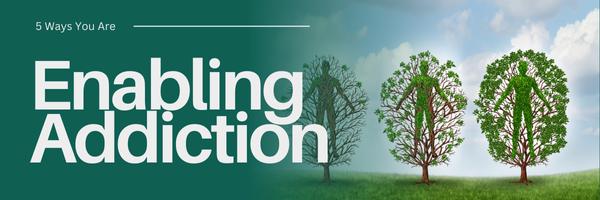5 Ways You May Be Enabling Someone’s Addiction
1. Avoiding the Problem
You may be too afraid to address the problem out loud. It may be too uncomfortable to promptly confront your loved one about their potential drug or alcohol abuse. It may be painful to watch but also seemingly painful to discuss with the possibility of your fear being the reality. This lack of confrontation or intervention leaves space for the loved one to continue the abuse without recognition of the pain being caused. It can also be easy to avoid by placing the blame on others or “the wrong crowd” rather than allowing the addict to accept responsibility for their own actions.
2. Putting the Addicts Needs Before Your Own
You may be exhausting yourself emotionally, mentally, spiritually, financially, and/or physically to ensure that their needs or wants are met at fear of their pushback or fall. Most enablers of addicts fear what lengths their loved one may go to in order to obtain their drugs or alcohol. This may feel as if you are helping your loved one, but in reality, you could be keeping them from seeing their true need for recovery.
3. Growing Resentment and Fear
As the addiction grows, it is likely that resentments have also grown between you and your loved one. As the resentments grow, so do the arguments and outward frustrations. The addict will in turn continue to use to medicate such frustrations. You may find yourself making fear-based decisions giving into demands of the addict. This can become a seemingly endless cycle.
4. The Bail Out
You may find yourself setting ultimatums but consistently folding in order to give your loved one “one last chance”. If you are always there helping them up before they face any true consequences, then it is difficult for your loved one to see their need for recovery or treatment of their addiction. The addict is learning that there will be no consequences. Your consistent “protection” from harm may be actually adding fuel to their addiction rather than saving them.
5. Rationalization
It is easy to rationalize anything that is difficult to confront rather within us or around us, especially when it comes to those we love. If you find yourself repeatedly giving your loved one excuses for their behavior, then you may be giving them support in their addiction without realizing it.
Typically, the addiction does not just affect the addicted. It is a disease that finds root in the family dynamics and eventually takes over all control until recovery for the entire family begins. If you have found yourself enabling a loved one in their addiction, then recovery is possible for you, as well. It first takes stepping out of the denial and confronting the disease of addiction head-on. Recovery and restoration are possible and fully obtainable.
For more information, visit the Substance Abuse and Mental Health Services Administration’s (SAMHSA) resource page for families coping with mental and substance abuse disorders: https://www.samhsa.gov/families
Second Chances also offers a Family Therapy Program to help strengthen and rebuild family relationships that have been damaged by addiction. Click here to learn more.


Recent Comments